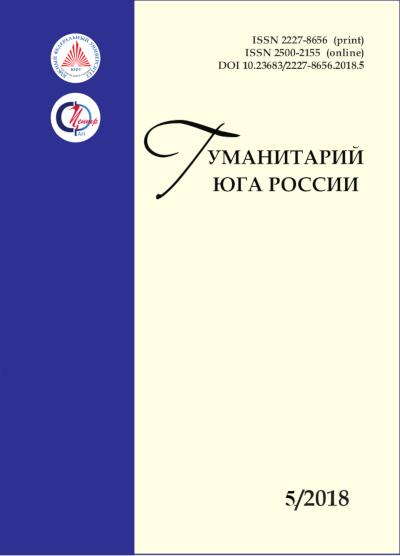Объективация труда в социальном мировоззрении: конкретные и абстрактные формы
Для цитирования
Побегуца А. В. Объективация труда в социальном мировоззрении: конкретные и абстрактные формы // Гуманитарий Юга России. 2018. Том 7. № 5. С. 76-85. DOI: https://doi.org/10.23683/2227-8656.2018.5.6
Аннотация
Статья посвящена исследованию форм осмысления труда в социальном дискурсе. Целью работы является аналитическое рассмотрение основных форм выражения категории труда в мировоззрении с точки зрения оценки их содержательной полноты. Теоретическая и практическая значимость проведенного анализа обусловлена двумя моментами: фундаментальным значением труда и выявленным расхождением между совокупностью основополагающих аспектов трудовой деятельности и уровнем их реализации в западной культурной традиции, которая в настоящее время оказывает существенное влияние на мировоззрение россиян. Труд является не только целенаправленной деятельностью, он также представляет собой важнейшее основание личностного самоопределения и общественной солидарности. И потому абстрактное отношение к труду может негативно отразиться на характере социальной активности человека. В статье проводится рассмотрение данного аспекта с точки зрения различия между двумя основными формами самоопределения, лежащими в основе социальной аксиологии – индивидуализма и коллективизма. Основными методами, использованными в ходе работы, являются социоконструктивистский подход и метод сравнительного анализа. В ходе проведенного обзора доказывается, что индивидуалистическая традиция основывается на идее утверждения личности посредством достижения успеха, что редуцирует категорию труда к достижению результата. Это сводит на нет ценность процессуального аспекта трудовой деятельности, значимость этической составляющей труда, в частности категории ответственности. При этом, если в западной хозяйственной культуре отсутствие четко выраженного этического аспекта труда компенсируется значимостью репутации, в российском обществе частичное заимствование западной модели приводит к социальной деформации. Рассмотрение коллективистской традиции, напротив, свидетельствует не только о ее глубоком соответствии российскому менталитету, но и о реализации в рамках коллективизма основных содержательных аспектов категории труда. Практическая значимость работы связана с отражением актуальных тенденций развития российского общества, оценкой перспектив и возможных направлений развития российской хозяйственной культуры.
Ключевые слова:
труд, самоопределение, общество, социальное мировоззрение, индивидуализм, коллективизм
Литература
Гедзь К.Н. Деятельность как индивидная форма самоопределения субъекта // Уч. зап. Казан. ун-та. Гуманит. науки. 2013. № 1. С. 34–39.
Данилова М.И. Индивидуализм: история и современность : дис. ... д-ра филос. наук : 24.00.01. Ростов н/Д., 2001. 221 с.
Данилова М.И. Русская философская традиция: «этика хозяйствования» // Философия и культура в контексте времени. Краснодар : КубГАУ, 2017. С. 48–64.
Дюркгейм Э. О разделении общественного труда. Метод социологии : пер. с фр. / Э. Дюркгейм, А.Б. Гофман, В.В. Сапов. М. : Наука, 1991. 572 с.
Кафтан В.В. Философское осмысление и социальное измерение экономического пространства // Пространство и время. 2016. № 3–4 (25–26). С. 55–63.
Мертон Р. Социальная теория и социальная структура. М. : ACT, Хранитель, 2006. 873 с.
Попова А.В. Концепция «цельного» человека в философии А.А. Богданова // Вестник ОГУ. 2012. № 7 (143). С. 55–59.
Сычева О.А. Коллективизм и индивидуализм в отношении к труду россиян (в рамках концепции динамических системных матриц) // СЭПТП. 2011. № 5. С. 7.
Фромм Э. Бегство от свободы = Die Furchtvor der Freiheit (1941) / пер. Г.Ф. Швейника. М. : АСТ, 2011. 288 с.
Фромм Э. Иметь или быть = To Have or to Be? (1976) / пер. Э.М. Телятниковой. М. : АСТ, 2010. 320 с.
Шарипов А.М. Интерпретация учения И.А. Ильина о месте культуры в теории социального государства // Культурное наследие России. 2014. № 4. С. 36–39.
Данилова М.И. Индивидуализм: история и современность : дис. ... д-ра филос. наук : 24.00.01. Ростов н/Д., 2001. 221 с.
Данилова М.И. Русская философская традиция: «этика хозяйствования» // Философия и культура в контексте времени. Краснодар : КубГАУ, 2017. С. 48–64.
Дюркгейм Э. О разделении общественного труда. Метод социологии : пер. с фр. / Э. Дюркгейм, А.Б. Гофман, В.В. Сапов. М. : Наука, 1991. 572 с.
Кафтан В.В. Философское осмысление и социальное измерение экономического пространства // Пространство и время. 2016. № 3–4 (25–26). С. 55–63.
Мертон Р. Социальная теория и социальная структура. М. : ACT, Хранитель, 2006. 873 с.
Попова А.В. Концепция «цельного» человека в философии А.А. Богданова // Вестник ОГУ. 2012. № 7 (143). С. 55–59.
Сычева О.А. Коллективизм и индивидуализм в отношении к труду россиян (в рамках концепции динамических системных матриц) // СЭПТП. 2011. № 5. С. 7.
Фромм Э. Бегство от свободы = Die Furchtvor der Freiheit (1941) / пер. Г.Ф. Швейника. М. : АСТ, 2011. 288 с.
Фромм Э. Иметь или быть = To Have or to Be? (1976) / пер. Э.М. Телятниковой. М. : АСТ, 2010. 320 с.
Шарипов А.М. Интерпретация учения И.А. Ильина о месте культуры в теории социального государства // Культурное наследие России. 2014. № 4. С. 36–39.
Форматы цитирования
Другие форматы цитирования:
APA
Побегуца, А. В. (2018). Объективация труда в социальном мировоззрении: конкретные и абстрактные формы. Гуманитарий Юга России, 7(5), 76-85. https://doi.org/10.23683/2227-8656.2018.5.6
Раздел
ФИЛОСОФИЯ И ОБЩЕСТВО






